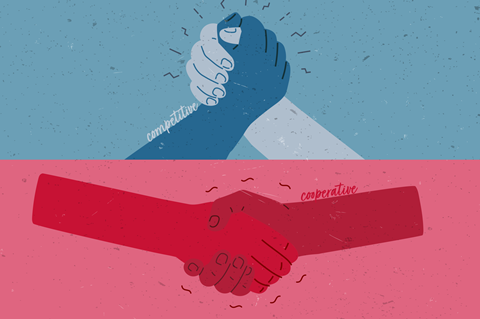Was Jesus a communist or capitalist? David Instone-Brewer explores what the Bible tells us about how to vote

Different countries have a bewildering number of names for their political parties, but the pundits classify them in two broad groups – Right and Left. I prefer the terms ‘competitive’ and ‘cooperative’.
Some parties promote competition between businesses so that the best thrive. Other countries are regarded as competitors too, often with the result that these parties are not very keen to help poorer nations while their own country has problems. They emphasise that individuals should similarly concentrate on providing for themselves or their own families rather than receiving help from the government or charity. These parties may be described as ‘capitalist’ (because they support business competitiveness), ‘nationalist’ (because they concentrate on outcomes for their own country), or ‘low taxation’ (because they believe families should be self-sufficient).
They are often known as ‘right wing’ – a metaphor (along with ‘left wing’) that originated in the French revolution. When the revolutionary government met to draw up a new constitution, members who wanted to adhere more closely to tradition sat on the right of the assembly president, and those who wanted more change sat on his left.
Parties on the political left normally have an emphasis on promoting cooperation rather than competition between businesses, sometimes even merging rival companies by nationalisation. They are more likely to seek cooperation between nations by promoting relief organisations and creating common standards – policies that reduce competition based on low-quality goods or reduced worker welfare. And the rich are required to help the poor through higher taxation.
What does the Bible say?
Neither system of government is, in itself, better or worse from a biblical perspective. God’s law, given to the nation of Israel, was a blend of both. Families owned land which they could farm or sell in exchange for a town house or equipment such as carpentry tools. In this competitive environment, some families grew immensely rich while others became poor and had to sell their land to survive.
This capitalist economy was tempered by a strong emphasis on helping the poor, and by laws against exploiting their poverty (Exodus 22:26; Deuteronomy 24:14-15). At every harvest, the poor could help themselves to anything the harvesters missed or dropped – as Ruth did (Ruth 2:2-3). And in every seventh ‘sabbath’ year, when the land rested without ploughing or planting, the poor were allowed to take whatever grew by itself (Leviticus 25:1-7).
Sadly, this capitalism with social support didn’t work perfectly. While property laws were applied assiduously, laws supporting the needy and principles such as “love your neighbour” (Leviticus 19:18) were neglected. So, the rich gradually got richer and the poor eventually had nothing left to sell. To deal with this, God commanded a ‘Jubilee’ reset every 50 years. Debts were to be cancelled and family land that had been sold was to be returned, so everyone had somewhere to grow food and start again (Leviticus 25:8-13).
A party that encourages competition and one that encourages cooperation can each bring prosperity
However, we never read that this actually happened and, in time, the rich became powerful enough to make sure that it never would (Isaiah 5:8, Micah w 2:2). At the end of 2 Chronicles (the last book in the Hebrew Bible), God complained that they hadn’t kept the sabbath years either – in fact, they’d missed 70 of them. Because of this, he exiled them for 70 years (2 Chronicles 36:21).
Tax policies often determine votes because everyone hates taxes and, in first-century Israel, the tax-collectors were the lowest form of life. It is therefore interesting that Jesus ate with them and converted some: Zacchaeus gave his wealth to support the poor (Luke 19:1-10) and Matthew became a disciple (Matthew 9:9-13). Jesus even performed a miracle so that he could pay his own temple tax to show he wasn’t a tax-avoider (Matthew 17:24-27).
Value the poor
Political systems go wrong when they veer too much in one direction or another. Cooperative socialists can decide to nationalise everything and become communist regimes run by an unquestionable elite. Competitive capitalism can create a few super-rich who are able to circumvent taxes and laws that support the poor.
Voters can be fooled – but not forever. Given the opportunity, they will halt the slide, just as God did when he intervened with his Jubilee plan for Israel. Both extreme communism and capitalism leave the poor owning nothing. The Jubilee reset allowed the rich to keep their houses and wealth, but they had to cancel loan repayments and redistribute the land so everyone could eat and be free of debt slavery.
This is why ‘change’ is such a powerful political campaigning word. A party that encourages competition and one that encourages cooperation can each bring prosperity, but they can both later mature into something malign. When one type of party is in power too long, things go wrong and a reset is needed. Alternatively, if change happens too often, the lack of stability makes it difficult for businesses and individuals to plan and prosper. So, in a democracy, change doesn’t happen till the majority of the population decides it is needed.
When we are praying about how to vote, it is perhaps best to consider what the poor and disadvantaged are praying for. Because we know that Jesus would be on their side.







































1 Reader's comment